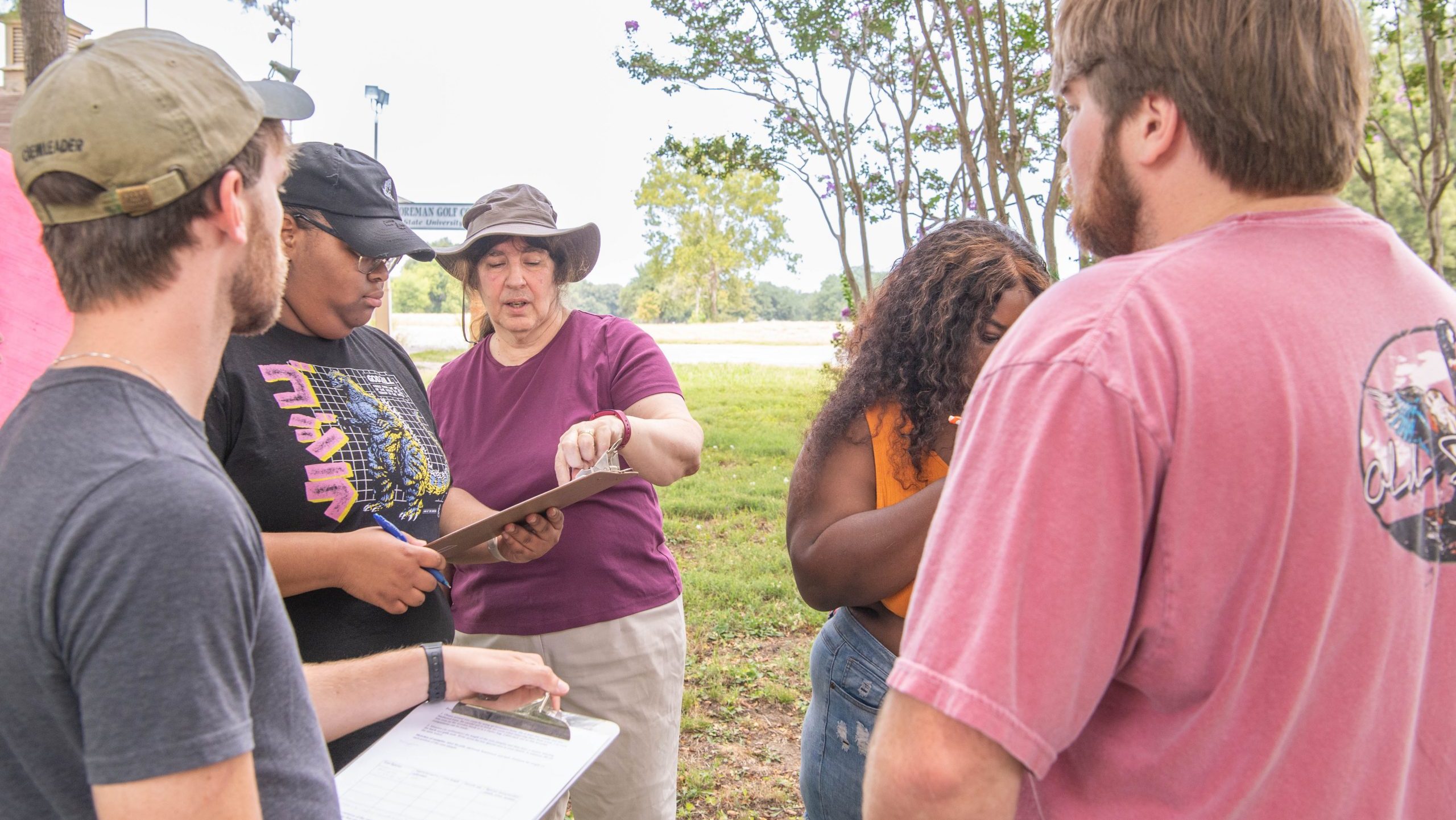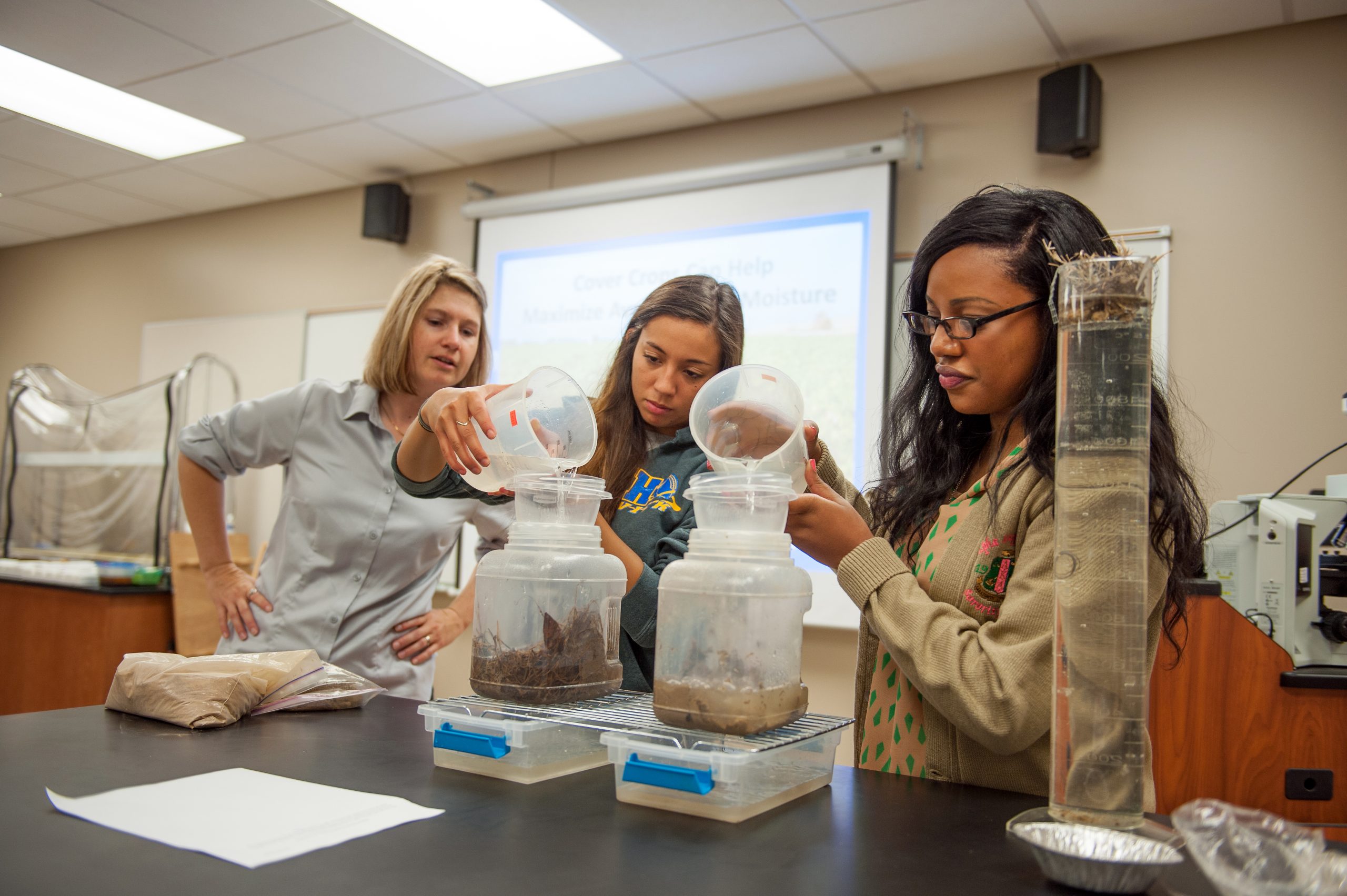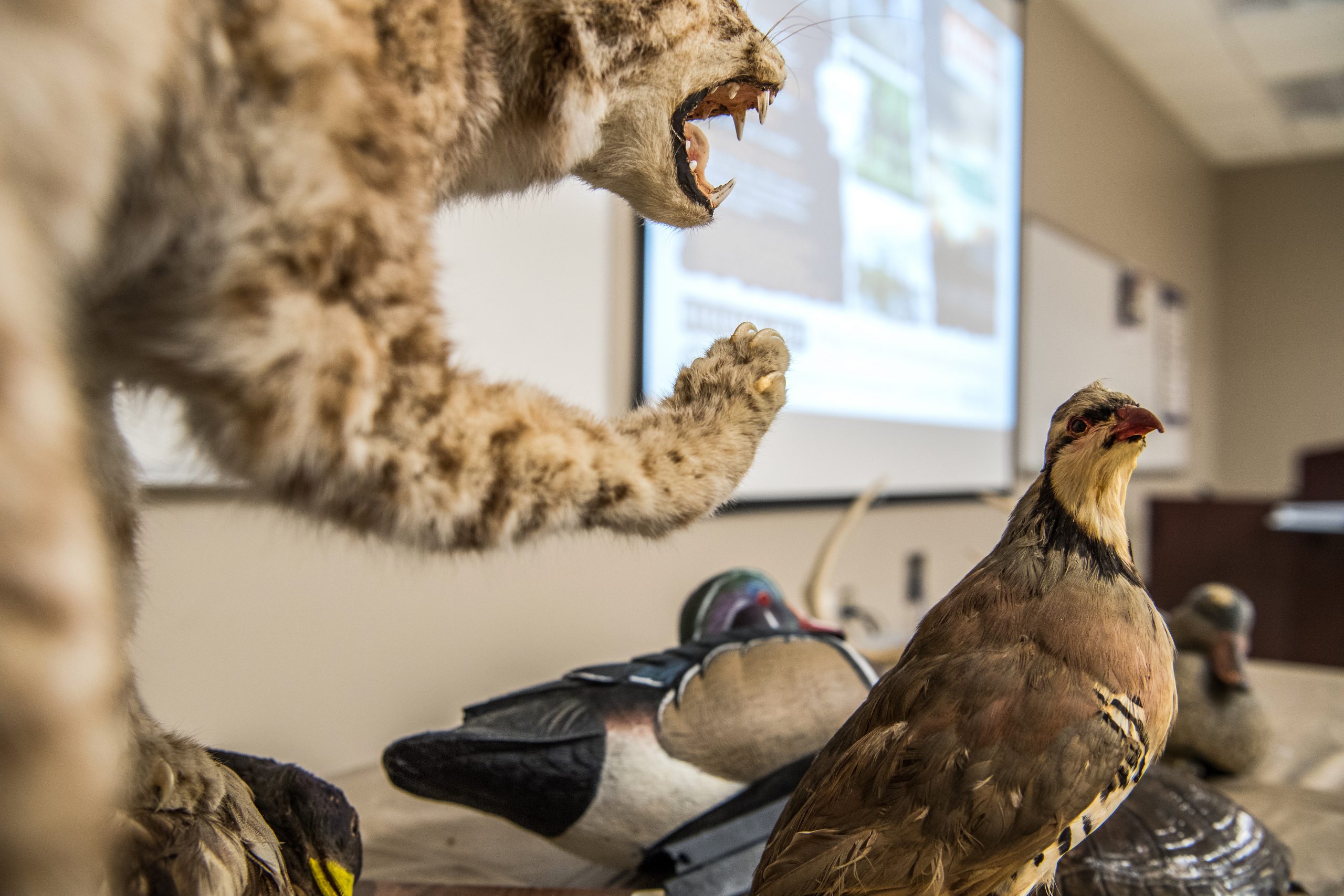Delta State University is the only state university in Mississippi that offers a Bachelor of Science in Environmental Science. Environmental Science is an interdisciplinary and integrated science. It embraces biological, chemical, and physical aspects of the environment and their effect on organisms. It also encompasses political, social, and geographical components. Students interested in saving wetlands, preserving a forest, improving water, soil, and air quality, protecting local wildlife, and climate change should consider environmental science.
Clubs and Organizations
Acceptance Rate to Graduate School
Job Placement Rate
Why Choose Environmental Science at DSU?

Our Environmental Science program is designed to help students learn about local, national, and global issues from a scientific perspective. Students learn laboratory, field, analytical, problem solving, and other skills throughout their coursework.
- Applications accepted year round
- Flexible and part-time course scheduling
- Online and in-person student advisement
- Hands-on learning experience
- Internship opportunities
- Employment opportunities
- Funded student-faculty research opportunities
- Research presentation opportunities
Concentrations in Environmental Science

General Environmental Science
Environmental science is an interdisciplinary field that utilizes ecology, geology, biology, chemistry, engineering, physics, and meteorology to study the environment. Classes encompass soil, water, and air quality, taxonomy, conservation, ecology, evolution, environmental policy, and more. Students in this concentration also take two upper division social science classes, environmental microbiology, Physical Geology for Life Sciences, and a one-semester organic chemistry course. Recent graduates work for various federal and state government agencies and private industries, including Mississippi Department of Energy Quality, USDA-ARS, US Geological Survey, Center of Toxicology and Environmental Health, and more.

Wildlife Management
The Wildlife Management concentration provides students with a comprehensive education in maintaining delicate balances between animal and plant populations with other environmental factors. Students will gain in-depth, hands-on, and critical-thinking skills that will prepare them for potential employment in conservation and wildlife management agencies or for entrance into graduate programs. Regular classes, field trips, capstone seminar, undergraduate research projects, and internships range from analyzing coyote scat, to assessing the impact of climate changes on biodiversity, to conducting surveys on Bengal tigers. Upon completion of this concentration, students will quality for Wildlife Certification through The Wildlife Society in addition to the Bachelor of Science degree.

Agribusiness
The Agribusiness concentration blends courses associated with Environmental Science and General Business. Students will have the option of taking more courses in business or Environmental Science when going through the program, three GIS classes, and 9 science courses including General Biology, Foundations in Environmental Science, Environmental Regulations, General Ecology, Soil Science, and Biology, etc. Students will be able to choose to have an adviser in business or Dr. Nina Baghai-Riding in Environmental Science.
Delta State also offers a more business-focused agri-business concentration, through the B.B.A. in General Business program.
What Can I Do with a Bachelor of Science in
Environmental Science?
By earning a B.S. degree in Environmental Science, graduates will know how to conduct field surveys, analyze data, write reports, and work effectively with others. They learn skills that make them successful in the workforce. Students can learn how to use assorted lab and field equipment including a scanning electron microscope. Students can also successfully be admitted into graduate degree programs to further enhance their skills and knowledge about a particular science discipline that relates to Environmental Science: entomology, agriculture, marine biology, toxicology, and more. Some jobs in Environmental Science include:
- Soil conservationist
- Naval oceanographic biologist
- Resource conservationist
- Emergency/Disaster management planner
- Biological science technician
- Environmental scientist
- Environmental manager
- Environmental compliance specialist
- Wildlife biologist
Environmental Science Scholarships
Delta State’s Environmental Science program is more affordable than many of its contemporaries offering similar opportunities. At DSU, we’re going to automatically consider you for scholarships. Delta State offers a scholarship for Environmental Science majors that is based on academic performance and is awarded in the spring semester to a sophomore, junior, or senior. Many Environmental Science students, also have received the Johnny Outz scholarship, which is also based on academic performance. Students may also be eligible for non-program specific scholarship opportunities.
Program Goals
Students in the Bachelor’s program in Environment Science will gain the skills to be able to evaluate complex scientific problems that are currently impacting the earth as well as analyze complex interactions that occur inside and between environmental systems.
Admission Requirements
Applicants of this program must meet Delta State University’s undergraduate admission requirements.
It is recommended that a prospective student meet with a Science faculty member prior to admission. Transfer students from community colleges should have completed 1 year of major’s Biology, 1 year of Chemistry, College Algebra, Trigonometry, and General Electives in order to graduate in two years.
Curriculum
The following courses are required to complete the major in Environmental Science.
Environmental Science (Core)
| Course Number | Course Title | Credits |
| BIO 100 | General Biology I | 4 |
| BIO 101 | General Biology II | 4 |
| BIO 301 | Ecology | 4 |
| GIS 202 | Introduction to GIS | 3 |
| TOTAL | 15 | |
Agribusiness (Concentration)
| Course Number | Course Title | Credits |
| Required Courses | 48 | |
| BIO 123 | Foundations of Environmental Science | |
| BIO 309 | Environmental Regulations | |
| BIO 328 | Genetics | |
| BIO 416 | Soil Science and Biology | |
| GIS 310 | Geospatial Analysis | |
| CHE 215 | Introduction to Organic Chemistry | |
| CHE 216 | Introduction to Organic Chemistry Laboratory | |
| REM 316 | Imaging Science: Passive Techniques | |
| ACC 220 | Financial Accounting I | |
| ACC 320 | Managerial Accounting | |
| CIS 205 | Microcomputer Applications | |
| CIS 300 | Management Information Systems | |
| GBA 220 | Legal Environment of Business | |
| MGT 300 | Principles of Management | |
| FIN 300 | Business Finance | |
| Select one from the following | 4 | |
| BIO 319 | Applied and Environmental Microbiology | |
| BIO 340 | Entomology | |
| BIO 404 | Economic Botany | |
| CHE 434 | Environmental Chemistry | |
| TOTAL | 52 | |
Wildlife Management (Concentration)
| Categories | Course Number and Course Title | Credits |
| Required | BIO 221: Introduction to Wildlife Management | 3 |
| BIO 309: Environmental Regulation | 3 | |
| BIO 321: Wildlife Techniques | 4 | |
| BIO 459: Conservatory Biology | 4 | |
| BIO 463: Wildlife Habitat Management | 4 | |
| Biology | Select three of the following courses: BIO 319: Applied and Environmental Microbiology BIO 328: Genetics BIO 340: Entomology BIO 415: Materials and Methods in Environmental Science BIO 425: Medical Entomology BIO 440: Evolution and Systematics BIO 447: Parasitology BIO 477: Wetland Ecology BIO 478: Population Ecology |
10-12 |
| Vertebrate Zoology | Select two of the following courses: BIO 439: Field Herpetology BIO 461: Mammalogy BIO 462: Ornithology |
8 |
| Botany | Select three of the following courses (one must be BIO 312 or BIO 411): BIO 312: Dendrology BIO 404: Economic Botany BIO 405: Plant Physiology BIO 408: Biology of Nonvascular Plants BIO 410: Plant Anatomy BIO 411: Elements of Plant Systematics |
10-11 |
| Geospatial Technology | Select one of the following courses: GIS 310: Geospatial Analysis GIS 461: Geospatial Mathematics, Algorithms, and Statistics |
3 |
| Physical Sciences | Select one of the following courses: PHY 221/233: Physics for the Life Sciences I / Physics for the Life Sciences Laboratory I, or BIO 314: Physical Geology for the Life Sciences, or BIO 416: Soil Science and Biology, or PHY 314: Physical Geology for the Life Sciences |
4 |
| TOTAL | 53-56 | |
General Environmental Science (Concentration)
| Categories | Course Number and Course Title | Credits |
| Required | BIO 123: Foundations of Environmental Science BIO 314: Physical Geology for the Life Sciences, or PHY 314: Physical Geology for the Life Sciences BIO 319: Applied and Environmental Microbiology BIO 415: Materials and Methods in Environmental Science BIO 470: Internship (with advisor and division chair approval), or BIO 490: Capstone Seminar CHE 215: Introduction to Organic Chemistry CHE 216: Introduction to Organic Chemistry Laboratory |
20 |
| Select one | Select one of the following 200- or 300-level courses: BIO 221: Introduction to Wildlife Management BIO 309: Environmental Regulation BIO 312: Dendrology BIO 321: Wildlife Techniques BIO 328: Genetics BIO 340: Entomology CHE 311: Quantitative Analysis CHE 351: Physical Chemistry for the Life Sciences PHY 221/233: Physics for the Life Sciences I / Physics for the Life Sciences Laboratory I |
3-5 |
| Select three | Select three of the following 400-level courses: BIO 404: Economic Botany BIO 405: Plant Physiology BIO 408: Biology of Nonvascular Plants BIO 410: Plant Anatomy BIO 411: Elements of Plant Systematics BIO 414: Environmental Geology BIO 416: Soil Science and Biology BIO 439: Field Herpetology BIO 440: Evolution and Systematics BIO 442: Biotechnology BIO 447: Parasitology BIO 459: Conservation Biology BIO 461: Mammalogy BIO 462: Ornithology BIO 463: Wildlife Habitat Management BIO 477: Wetland Ecology BIO 478: Population Ecology CHE 434: Environmental Chemistry CHE 440: Biochemistry I CHE 460: Instrumental Analysis |
9-12 |
| Select three | Select three from any BIO 300- or 400-level course, any CHE 300- or 400-level course, or GIS 310, with the exception of BIO 348. | 9-12 |
| Select two | Select any two of the following social science courses: GEO 303: World Regional Geography GEO 407: Economic Geography GEO 416: Conservation of Natural Resources PSC 302: Politics of Globalization SOC 421: Sustainable Development SOC 422: Environment and Society SOC 485: Demography and Human Populations Studies |
6 |
| TOTAL | 47-55 | |
Degree Requirements
To earn this degree, you must successfully complete at least 120 credits, including your general education requirements and the major requirements below. You must also earn a grade point average of at least 2.0 in the major field overall and successfully complete the Senior Capstone project.
| General Education | 40-41 |
| University Requirement | 1 |
| Special Degree Requirements | 6 |
| Major | 61-77 |
| Electives | 2-11 |
| TOTAL DEGREE REQUIREMENTS | 120 |
For more information on degree requirements and specifics on courses needed to complete the degree, consult the Undergraduate Academic Catalog. For a semester-by-semester breakdown on how you can complete this degree in 4-years, visit academic maps.
Fees
Tuition at DSU covers the cost of classes. Courses that contain a lab have lab fees which covers materials, lab equipment and supplies, handouts, and vans for transporting students to a field site.

